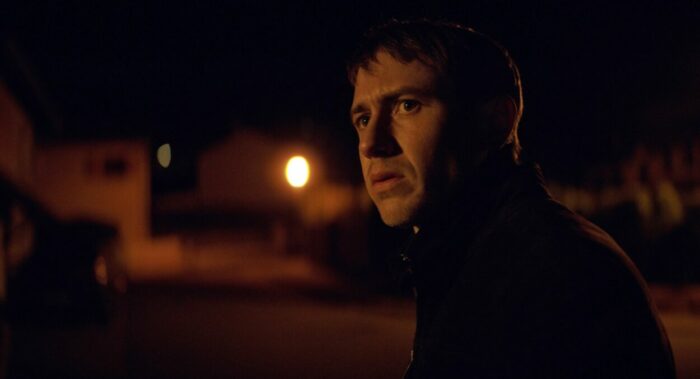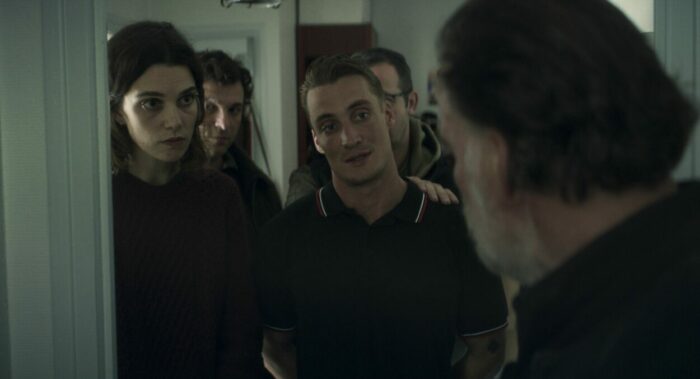A title card at the opening of director Dominik Moll’s brilliant French police-procedural The Night of the 12th might just give away its ending. “Each year, the French police open more than 800 murder investigations. Nearly 20 percent remain unsolved. This film follows one of them.” There’s just enough ambiguity in that final pronoun—does them refer to the unsolved or to the totality of cases? As the narrative progresses, it’s hard not to hope against hope for the resolution of the case it follows, the murder by immolation of a vibrant young woman, despite multiple suspects and dwindling leads. In the end, The Night of the 12th manages to deconstruct the tropes of the procedural to offer a probing treatise on both the genre and the plague of violence against women.
For much of its runtime, The Night of the 12th follows the generic recipe of the procedural, beginning with the crime itself. A young woman named Clara is attacked, lit on fire, by a masked assailant in the middle of the night on the streets of Grenoble. It’s a heinous, gruesome, premeditated murder, a difficult moment to watch even for viewers inured to onscreen violence. The case is assigned to a young, just-promoted police captain named Yohan Vivés (Bastien Bouillon), who realizes the violent nature of the crime suggests revenge—likely, he and his comrades conclude, a spurned ex-lover, a conclusion that guides the direction of their investigation.

The beautiful, ebullient Clara (Lula Cotton Frapier), seen only in the few brief moments before the attack, however, had more than a few such ex- and current lovers. As a consequence, as Vivés and his team, including the grizzled veteran Marceau (Bouli Lanners), investigate, their prime suspects form a parade of young and less-young men of few means and fewer brain cells, local mugs and thugs prone to violence and misogyny as a matter of everyday ritual. Clara’s killer could have been any of them, except for the fact that no evidence can be found to single one out from the others. And while the sensitive, brooding Vivés ponders the crime, his team cannot help themselves from judging the victim for her taste in men and sexual proclivity.

Here is where The Night of the 12th, adapted from a short sequence in the nonfiction book 18.3: Une Année à la Pj by Pauline Guéna, becomes less a traditional police-procedural culminating in the arrest and conviction of a perpetrator and more a thought-provoking treatise on the enculturation of violence against women. Any one of Clara’s half-dozen ex-lovers seems a perfectly plausible suspect: one recorded a rap hating on the girl, another is a confirmed domestic abuser, another a loner hermit weirdo. And yet the police force—consisting entirely of men—cannot, except for Vivés, help but make conclusions about the victim’s life choices. As Clara’s best friend Nanie (Pauline Serieys) so astutely points out, what does it matter who she slept with? She was killed for one reason: “because she was a girl.”

Those words hit with the impact of a closed fist. Though the force is comprised of men, it is the women of the story—Clara, her friend Nanie, a sympathetic district judge (Anouk Grinberg), and new police recruit Nadia (Mouna Soualem)—whose voices disrupt the typical patterns and perspectives of the police procedural. The latter two in particular suggest new directions for the investigation. Ultimately, though, one realizes that even bringing Clara’s killer to justice won’t make for a satisfactory conclusion to her narrative: that this killing is not only an injustice but, sadly, an unresolvable commonplace.
Their performances are excellent and nuanced throughout, as is Bouillon’s as Vivés, whose development as a character—as a person, not just an officer—is crucial to the narrative. His manner of exercise is cycling at the velodrome, racing around and around the banked track, releasing his mounting frustrations. But it’s clear that his doing so is taking him only in circles. His time investigating Clara, learning from Nanie, meeting the judge, and working with Nadja, ultimately takes him to another more invigorating and fulfilling place, one with more promise and perspective. As his partner Marceau, Lanners is equally deserving of praise as the jaded cop who’s seen too much for too long.

Following its international premiere at Cannes, The Night of the 12th was nominated for 11 César Awards, winning seven, including Best Film, Best Director (Dominik Moll), Best Adapted Screenplay (Moll and Gilles Marchand), Best Supporting Actor (Lanners), Most Promising Actor (Bouillon) and Best Sound. Its acclaim is justly deserved. Not only does the film adroitly finesse the genre, calling into question its most conventional tropes and themes, but it also serves to illustrate the problem that is never solved: the ongoing, never-ending, infinitely frustrating, and sadly dispiriting rage of men against women.
Directed by Dominik Moll, The Night of the 12th is available on major VOD outlets iTunes, Amazon, Vudu and others August 1, 2023. 115 minutes, in French with English Subtitles.



